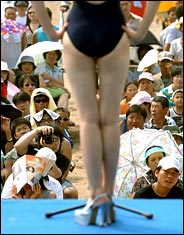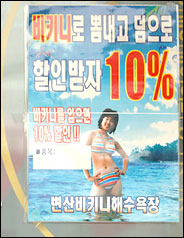등록 : 2005.08.24 17:15
수정 : 2005.08.25 23:41
 |
|
미스 변산비키니 선발대회. 비키니를 입도록 한 규정에도 불구하고 참가자들은 원피스 수영복 차림이었다. 출처 : 뉴욕타임스
|
올 여름 해수욕장 개장을 앞두고 언론의 집중조명을 받은 곳은 전북 부안의 변산해수욕장이었다. 정확한 해수욕장 이름은 변산 ‘비키니 해수욕장’. 드라마 속 삼순이가 희진이로 이름을 바꾸듯 이미 3년 전 이름을 바꾸고도 별다른 관심을 끌지 못하자 부안군은 올 여름 마침내 비장의 카드를 또 하나 빼어 들었다.
“비키니로 뽐내고 덤으로 10% 할인받자.”
언론들은 앞다퉈 이 사실을 보도했다. 비키니 차림의 피서객에게 숙박료와 식사비, 물놀이용 장비 대여료를 10% 할인해 준다는 친절한 설명도 덧붙였다. 지역 여성단체들이 나이트클럽 호객 행위를 연상시키는 마케팅을 두고 “성 상품화”라며 반발했지만, 이 사실을 제대로 보도한 언론은 거의 없었다. 지방자치단체에서 직접 나서서 ‘물관리’를 해준다는데 고마워하지는 못할망정 대거리할 일은 아니었던지, “남성 역차별”이라고 따지는 언론도 없었다.
개장 때와 달리 8월말 변산 비키니 해수욕장의 결산에 관심을 보인 곳은 국내언론이 아니었다. <뉴욕타임스>가 계절이 지나버린 쓸쓸한 바닷가를 찾았다. 뉴욕타임스는 지난 23일치 지면에 ‘피서객 유치계획의 아주 작은 계산착오’(A Tourism Plan's Itsy-Bitsy, Teeny-Weeny Miscalculation)라는 제목의 변산 발 기사를 내보냈다. 미국을 대표하는 세계적 권위지가 동아시아 시골 해수욕장에 관심을 보일만큼 부안군의 마케팅이 대박이었을까.
그러나 제목에서 보듯, 진지함의 대명사인 이 세계적 권위지는 부안군의 마케팅을 짓궂고 장난스럽게 바라본다. ‘아주 작다’는 뜻의 영어 속어인 ‘Itsy Bitsy Teenie Weenie’는 팝송 ‘Itsy Bitsy Teenie Weenie Yellow Polka Dot Bikini’(손바닥만한 노란색 땡땡이 무늬 비키니)에서 따온 것으로, 비키니 해수욕장과 연상작용을 일으키기 위해 애써 골라 단 제목으로 보인다.
기자는 기사의 첫 문장을 “‘비키니 차림 피서객 10% 할인’은 기발한 아이디어로, 이 해변을 발리나 와이키키 급으로 격상시킬 수 있는 확실한 방법으로 들렸다”로 시작한다. 그의 과장된 표현에서 ‘조롱’의 느낌을 받았다면 반미주의자이거나, 수안보 와이키키가 아닌 진짜 하와이 와이키키를 다녀와본 사람일지도 모른다.
“비키니 해수욕장 이름에 걸맞게 방문객들에게 새로운 인센티브를 제공해야 한다는 생각이 들었다.”
기자는 부안군 관계자 강흥연씨와 대합조개죽과 생대구를 전문으로 하는 바닷가 음식점에 마주 앉아 나눈 대화를 소개한다. 공무원 강씨는 요란한 마케팅이 정작 실속은 많지 않았다는 사실도 외신기자에게 이렇게 털어놓는다.
‘하지만 지금까지 비키니를 입은 사람들은 그렇게 많지 않았다고 강씨는 말했다. 비키니를 입은 피서객은 10%에 불과했는데 추후 조사에서는 이 수치가 과장된 것으로 보였다고 강씨는 지적했다.’
올해 실적이 어떻든, 외신 기자 눈에 강씨는 무척 집념이 강한 공무원처럼 비친 것 같다. “언젠가는 이곳이 발리나 동남아의 유명 해수욕장처럼 될 것”이라고 강씨는 말했고, 그는 “그것이 장기적 목표”라고 덧붙였다고, 기자는 전한다.
기자의 눈에 ‘아주 작은 계산착오’의 극적인 현장은 ‘미스 변산비키니 선발대회’였다. 기자는 “대회 참가자들은 비키니를 입도록 한 규정에도 불구하고 비키니 수영복을 뽐낸 건 전문 모델뿐이었고, 미인대회 참가자들은 여전히 원피스 수영복을 입고 있었다”고 보도한다.
또, 비키니를 입은 여성 몇명에게 수영복 선택에 대해 묻자 달아나버렸다거나, “많은 여성들이 비키니 수영복을 입지 않는 이유는 햇볕에 타기 싫어서”라고 설명하는 한 비키니 여성과 “누드비치로 하면 더 좋을 것 같다”고 말해 눈총을 받는 그 비키니 여성의 남자친구 얘기까지 상세히 전한다.
 |
|
비키니 차림 10% 할인 홍보 포스터. 출처 : 뉴욕타임스
|
기자는 끝으로 식료품점을 찾아 비키니와 관련한 매출실적을 취재하며, 발로 뛰는 현장기자의 전형을 보여준다.
‘노영환(24)씨가 일하는 식료품점에서는 행사가 시작된 뒤 10% 할인을 요구한 사람은 10명에 불과했다. “사람들이 약간 끼는 옷을 입었거나 비키니 탑만 입었어도 할인해줄 생각이다”고 노씨는 말했다.’
기자는 “보기드문 비키니는 내일을 기약할 것”이라며 담담하게 기사를 마무리하는데도, 그의 기사를 다 읽고나서도 조선의 저잣거리를 호기심 반 불쾌감 반으로 바라보는 구한말 서양 선교사의 눈길을 느낀다면 반미주의자이거나 진짜 와이키키에 다녀와본 사람일 가능성이 좀더 높다. 아니면 한때 주민들 몰래 방폐장을 유치하려고 했던 부안군수에 대해 나쁜 선입견을 가지고 있든지. 안영춘 기자 jona@hani.co.kr
|
|
<뉴욕타임스> 기사 원문
A shopkeeper's poster offers a 10 percent discount to anyone in a bikini. Byeonsan Bikini Beach was renamed to lure more visitors.
It all started back in 2003 when local officials here, racking their brains over how to lure visitors to this stretch on South Korea's rural west coast, decided that a name change was due. Byeonsan Beach was reborn, with "Bikini" in its name.
While the change might not persuade modest locals of the merits of bikinis or Speedos overnight, the reasoning went, it could attract less inhibited visitors from Seoul. But after droves of bikini-wearers failed to turn up last year, the locals had to come up with something else.
"Since it's called Bikini Beach, we thought we should give visitors an extra incentive," said Gang Heung Ueon, a spokesman for Buan County, sitting at a beachside fish restaurant specializing in clam porridge and raw cod.
A poster of a bikini-clad woman in the restaurant explained the new incentive, in effect since July 7: "Show off your bikini! Get a 10 percent discount on top!"
Of the 45 restaurants, motels and other businesses in the area, 38 were participating. But so far, bikinis have proven elusive, Mr. Gang said. Only 10 percent of beachgoers have opted for skimpiness, he said - a figure that, on later inspection, seemed a stretch.
Still, on a recent Saturday, expectations were high. The Miss Byeonsan Bikini Contest - called the Miss Byeonsan Beauty Contest until last year - was taking place. The contestants themselves would at least wear bikinis, or so went the promise.
"This beach might be compared one day to Bali or to other famous beaches in Southeast Asia," Mr. Gang said.
"It's," he added, "a long-term goal."
Byeonsan, like other local governments in the country, had little need to conceive of creative ideas until a decade ago. The central government had simply appointed administrators from Seoul to run local governments until 1995, providing little incentive for local officials to try to stand out.
But now "a lot of creative ideas are coming out of the regions from ambitious politicians who want to move on to higher office," said Ahn Young Hoon, a scholar at the Korea Research Institute for Local Administration.
Suffering a scarcity of industries and depopulation, rural areas are trying to create a distinct image - a "C.I.," or "company identity," in the jargon popular among local government officials - to attract tourists and investors. The word "amenity," used in English and unfathomable to most Koreans, has become the guiding principle for several local governments.
"You look behind the times if you don't use it at least three times in a presentation," Park Hyung Jae, a spokesman for the Namhae County government on the peninsula's southeastern shore, said of the "amenity" catchphrase.
After - or perhaps despite - looking up the word in a dictionary, Mr. Park concluded that it meant "regional, agricultural, environmentally friendly, pollution-free, primitive, natural, pure." The county now boasts of its "green amenity."
"It's now familiar because nowadays we use it as often as we eat kimchi," Mr. Park said, mentioning Korea's national dish.
In Seocheon County, directly north of here, "Amenity Seocheon" is the motto used to advertise the region's unspoiled wilderness. The county also proposed a dog-eating festival for lovers of the meat, which is considered a delicacy in Korea.
"But some pet-lovers opposed the idea and we dropped it," said Lee Jin Hee, a county official.
Byeonsan County, too, drew opposition from a women's group after announcing its bikini discount, Mr. Gang said.
Under a blazing sun, with many local men in shirts and trousers and women holding parasols, the bikini contest began at 2 p.m. on the beach. A few dozen local young women appeared on stage, wearing cancan dresses and then changing into one-piece swimsuits.
Few women in bikinis or men in Speedos could be seen on the beach. When asked about their choice of swimwear, several women in bikinis ran away.
"A lot of women won't wear bikinis because they don't want to get sunburned," said Choi Eun Jeong, 28, who wore a bikini but had not received the discount yet.
"I think it would have been better as a nude beach," her boyfriend, Lee Woo Ho, 32, added, drawing an angry glance.
The beauty contestants, still in their one-piece swimsuits, showed off their talents. A few sang. One would-be flight attendant gave airplane information in Korean, Japanese and English. Another walked suggestively around the stage. An especially tall contestant danced a sexy dance, towering over the M.C., who compared her to an eel.
Watching the contest, standing atop a five-inch mound of sand he had built, Byun Young Il, 35, bemoaned the fact that few men had chosen to wear the same kind of short swimsuit briefs he was wearing.
"In reality, it's better for Korean men to wear Speedos because their legs tend to be short and it makes them look taller," Mr. Byun said, a cigarette pack and orange lighter sticking out of the back of his briefs. "But they tend to be shy."
Professional models came on stage, sporting bikinis and swimsuit briefs. But as the bikini contest unfolded, chances that it would live up to its billing seemed to dim.
At the grocery store where Roh Yong Hwan, 24, worked, only about 10 people had asked for the discount since it went into effect.
"If what they're wearing is a little skimpy, or if they're at least wearing a bikini top, we'll give them the discount," Mr. Roh said.
The contest, as well as this summer day, was nearing its end. The beachgoers began packing up their belongings. The eel woman was crowned "Miss Byeonsan Bikini Beach."
And the bikini, as elusive as ever, would be for another summer day.
|
|
|
광고




기사공유하기